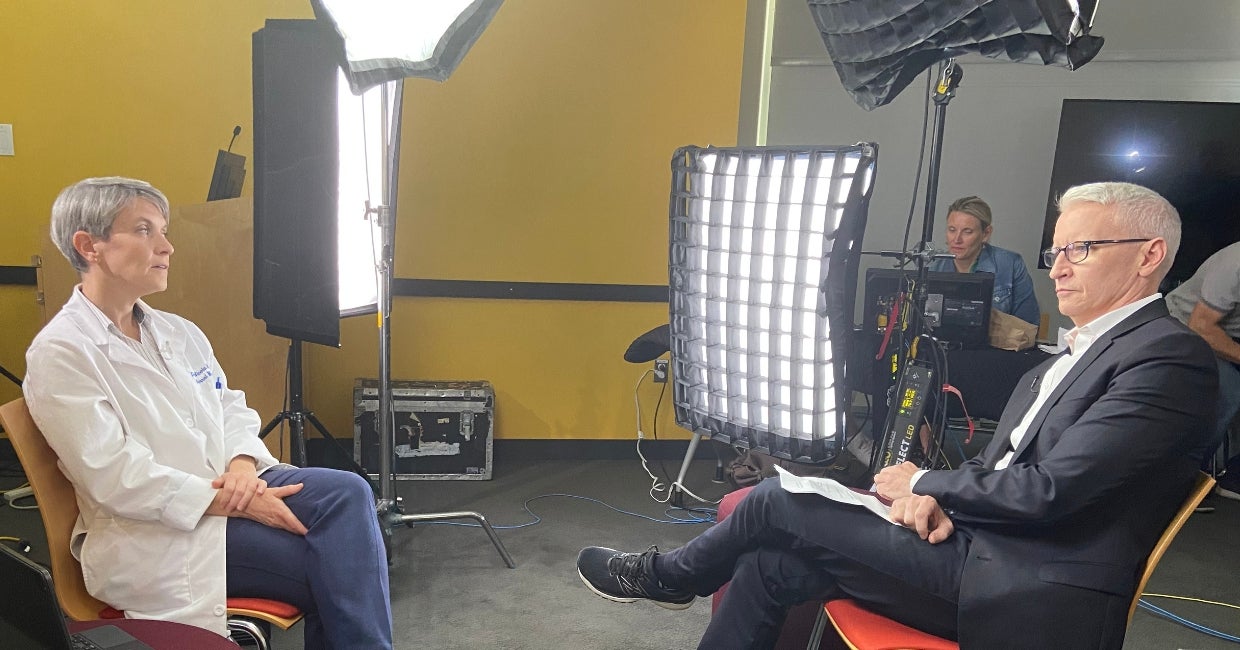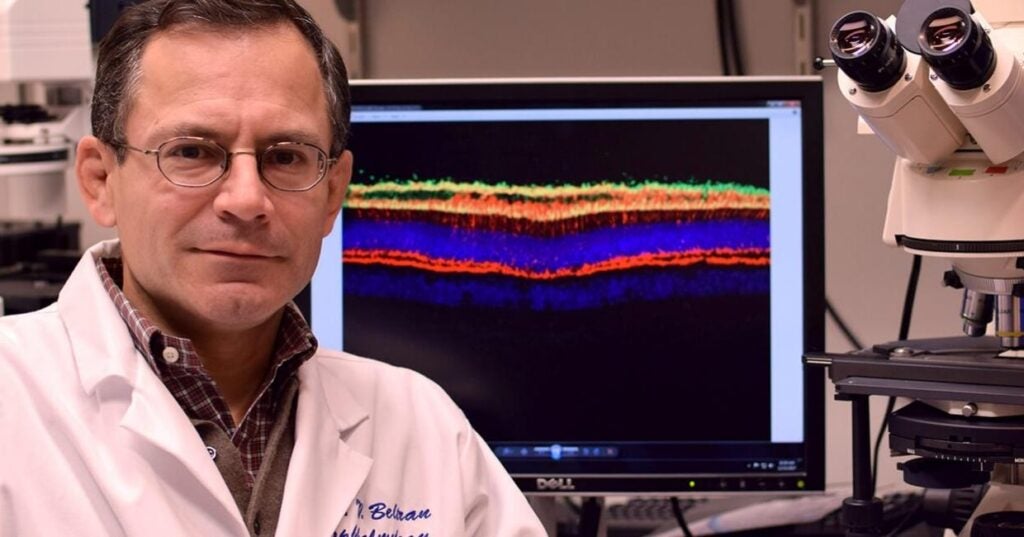Penn Vet’s Dr. Nicola “Nicky” Mason Appears on 60 Minutes

Nicola J. Mason, BVetMed, PhD, DACVIM (Internal Medicine), FCPP, MRCVS, of the School of Veterinary Medicine at the University of Pennsylvania (Penn Vet), was interviewed by 60 Minutes Correspondent and CNN Anchor Anderson Cooper. The interview, which aired on Sunday, November 27th, highlighted Mason’s role in leading the now completed clinical trials that evaluated a novel Listeria-based vaccine for its ability to improve the longevity and quality of life for client-owned dogs with osteosarcoma, a common canine bone cancer. The conversation was part of a larger segment that emphasized the growing recognition of the value of comparative medicine.
“We share many of the same genes with our canine companions. And for cancer research, that is an opportunity that scientists are trying to make the most of. It is called comparative oncology,” said Cooper. “Now funded in part by the White House’s Cancer Moonshot Initiative, doctors and scientists are studying naturally developing cancers, mostly in dogs, and using what they learn to speed potential treatments to them and us.”
Mason and Cooper explored the role of dogs with spontaneous osteosarcoma as a parallel patient population in which to evaluate novel immunotherapies to inform human clinical trials. Many of the cancers that naturally develop in dogs share important clinical, biological, and genetic features to those that develop in humans, making the dog a relevant, immune competent ‘model’ to accelerate the discovery of safe and effective treatments for both humans and dogs with cancer.
“What we’re trying to do is find a better way to determine which are the best treatments to take forward into humans,” said Mason. “We are very similar [to dogs]. I think more so than we might like to admit.”
Mason’s immunotherapy treatment consisted of a highly weakened form of the bacteria Listeria monocytogenes, which was genetically engineered to express the HER2/neu molecule. The vaccine stimulated an immune response that killed cancer cells that remained after traditional standard-of-care therapy (primary tumor removal through limb sparing surgery, or amputation, and follow-up chemotherapy).
The initial pilot study, which saw the first dog treated at Penn Vet in 2012, treated 18 client-owned dogs with the vaccine and demonstrated that those who received the vaccine lived more than two times longer than the reported survival times of dogs who did not receive the vaccine. Eight years later, in 2018, Mason and researchers from 11 other U.S. university-based veterinary centers, launched a larger, second trial that evaluated the immune response and overall survival of immunized dogs. The results of this study are pending publication.
Mason, who is a board-certified veterinary internist and immunologist, is The Paul A. James and Charles A. Gilmore Endowed Chair Professor, and Professor of Medicine and Pathobiology. For the past 14 years, she has been actively involved in evaluating the immunological responses of immune-based therapies in client-owned dogs suffering from lymphoma, osteosarcoma, and hemangiosarcoma.
The initial study was coordinated through Penn Vet’s Veterinary Clinical Investigations Center (VCIC), the School’s clinical research organization that supports the design, coordination, and implementation of veterinary clinical trials designed to identify novel approaches to disease diagnosis, management, and prevention. The VCIC is currently recruiting for more than three dozen clinical trials in all veterinary specialties, including 16 for naturally occurring cancers. To learn more about these trials call To learn more about these trials call 215.573.0302, or email at vcic@vet.upenn.edu.
Related News

A New Penn Vet Clinic Brings Support and Hope for Dogs with Retinal Disease
Zoey the cockapoo greeted life with tail-wagging joy. A mass of tawny curls, she loved everyone, and they loved her back.

Researchers Advance mRNA Delivery to the Retina Using Stabilized Lipid Carriers
Efficient delivery of synthetic mRNA to the retina remains one of the key hurdles in developing mRNA-based treatments for vision loss.

Penn Vet Researchers Evaluate a New Device That Could Streamline Vision-Saving Therapies
Retinal blindness caused by the death of photoreceptors, the light-sensing cells within the retina, affects millions of people worldwide. Novel gene and cell therapies to prevent or rescue vision loss…
About Penn Vet
Ranked among the top ten veterinary schools worldwide, the University of Pennsylvania School of Veterinary Medicine (Penn Vet) is a global leader in veterinary education, research, and clinical care. Founded in 1884, Penn Vet is the first veterinary school developed in association with a medical school. The school is a proud member of the One Health initiative, linking human, animal, and environmental health.
Penn Vet serves a diverse population of animals at its two campuses, which include extensive diagnostic and research laboratories. Ryan Hospital in Philadelphia provides care for dogs, cats, and other domestic/companion animals, handling more than 34,600 patient visits a year. New Bolton Center, Penn Vet’s large-animal hospital on nearly 700 acres in rural Kennett Square, PA, cares for horses and livestock/farm animals. The hospital handles more than 6,200 patient visits a year, while our Field Services have gone out on more than 5,500 farm service calls, treating some 18,700 patients at local farms. In addition, New Bolton Center’s campus includes a swine center, working dairy, and poultry unit that provide valuable research for the agriculture industry.

